!Accutane FAQs (PDF)
File information
Author: Owner
This PDF 1.5 document has been generated by Microsoft® Word 2010, and has been sent on pdf-archive.com on 10/09/2013 at 11:43, from IP address 122.148.x.x.
The current document download page has been viewed 1195 times.
File size: 1.33 MB (23 pages).
Privacy: public file
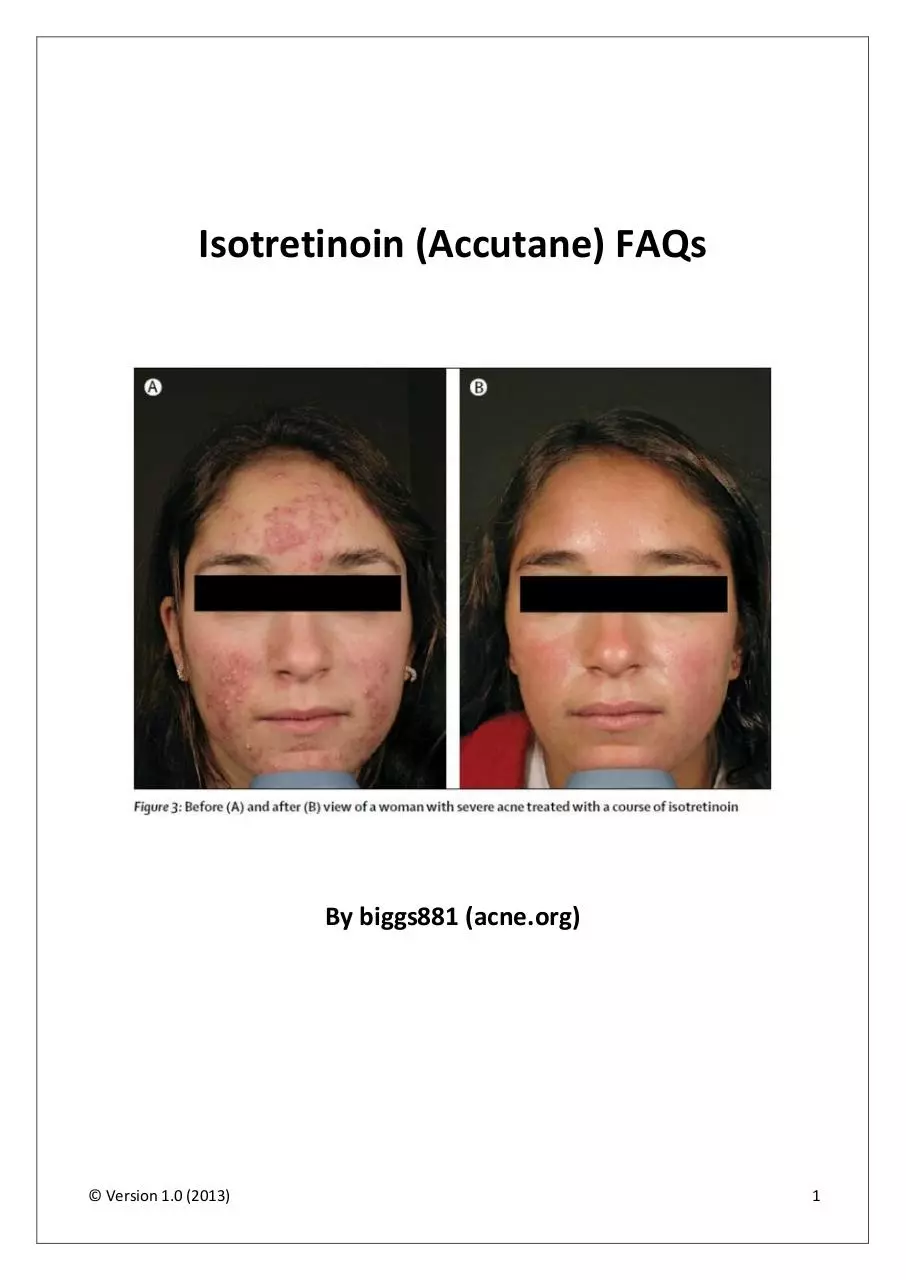
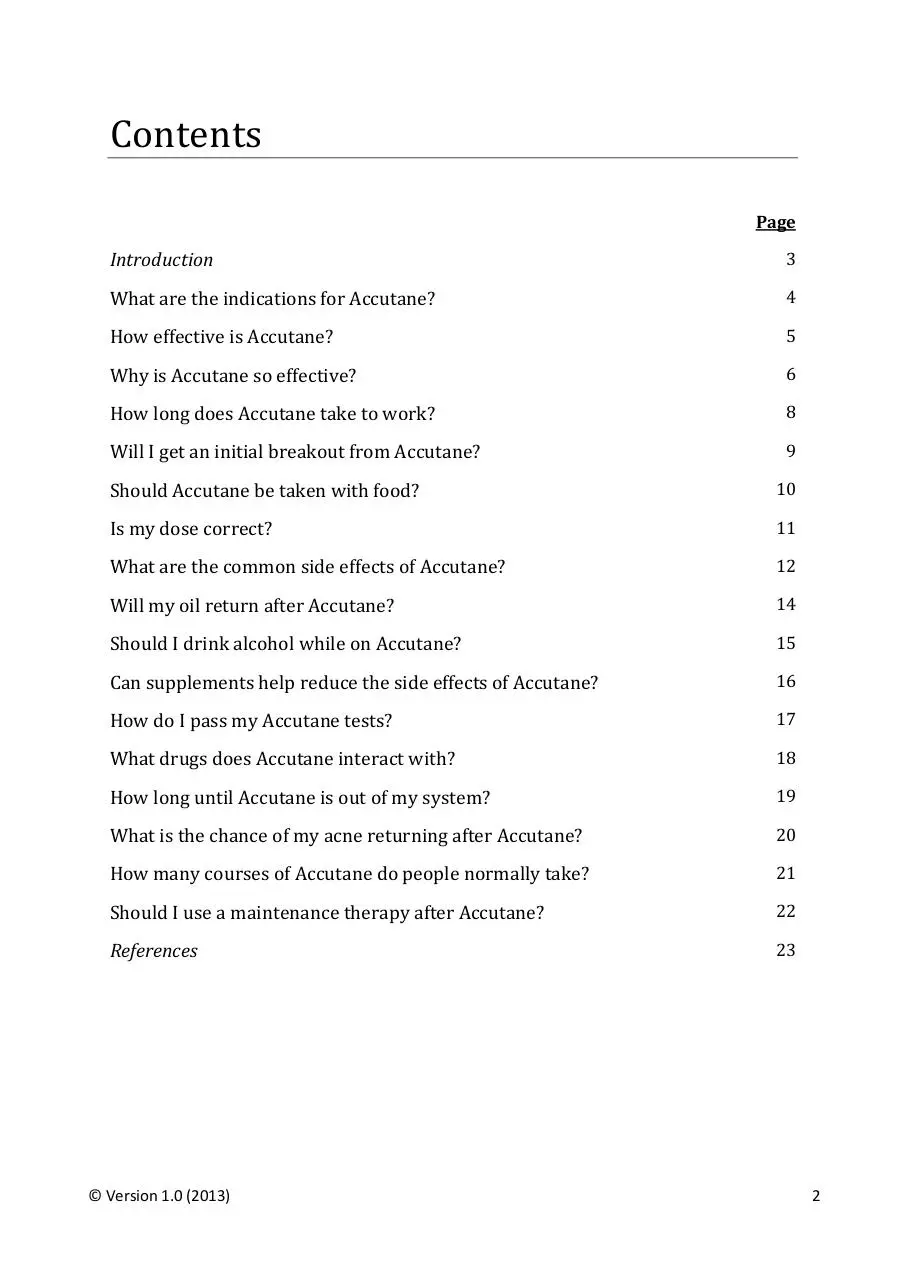
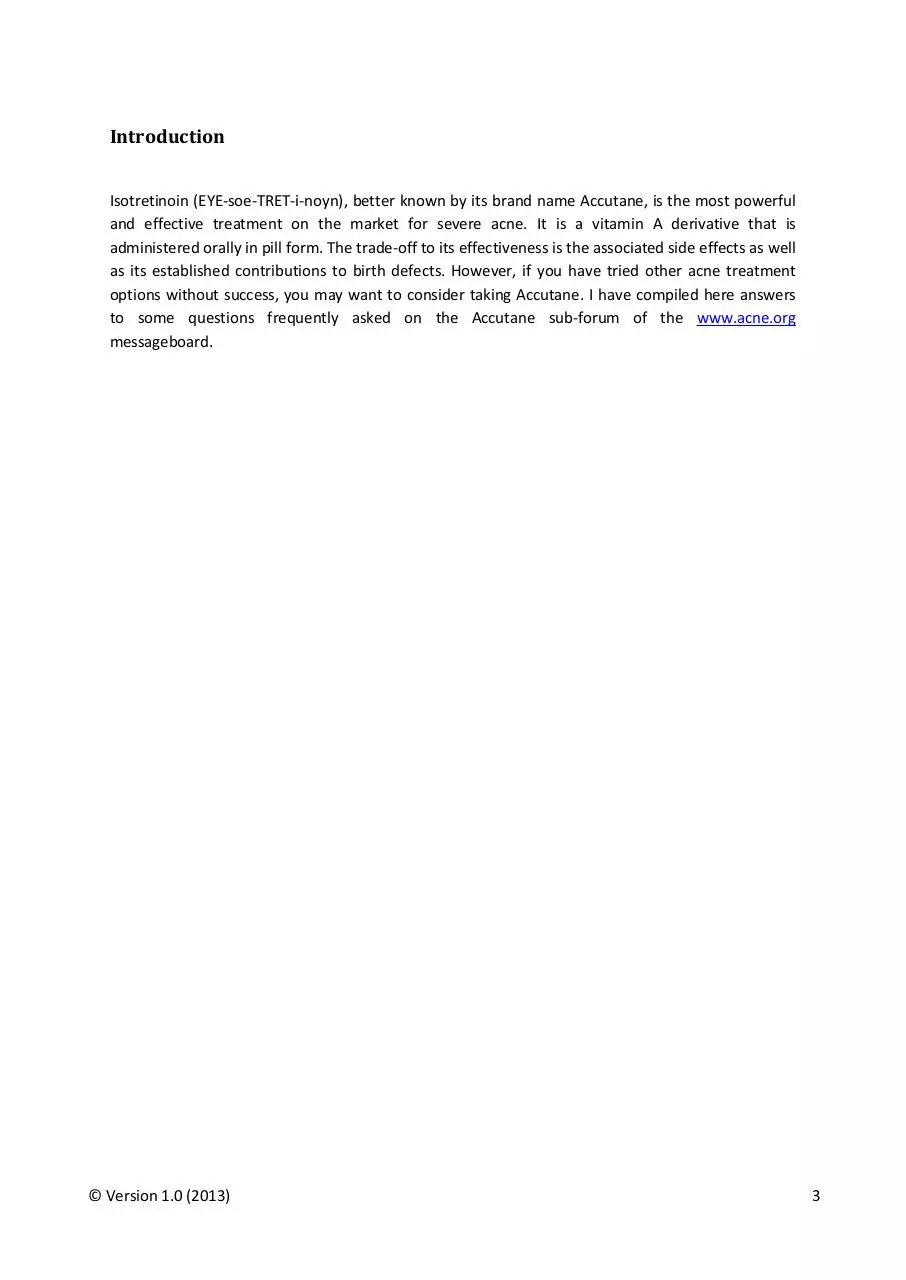
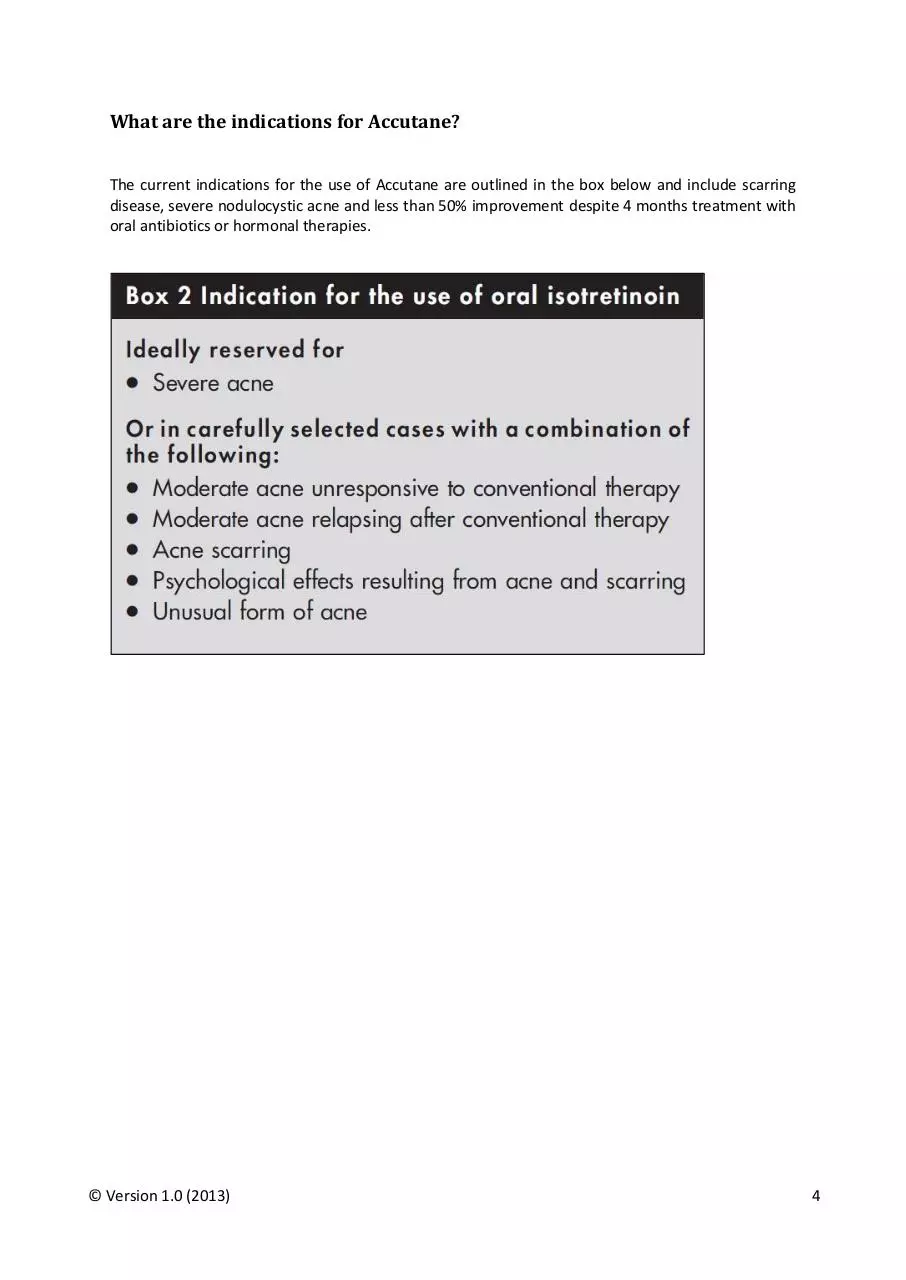

File preview
Isotretinoin (Accutane) FAQs
By biggs881 (acne.org)
© Version 1.0 (2013)
1
Contents
Page
Introduction
3
What are the indications for Accutane?
4
How effective is Accutane?
5
Why is Accutane so effective?
6
How long does Accutane take to work?
8
Will I get an initial breakout from Accutane?
9
Should Accutane be taken with food?
10
Is my dose correct?
11
What are the common side effects of Accutane?
12
Will my oil return after Accutane?
14
Should I drink alcohol while on Accutane?
15
Can supplements help reduce the side effects of Accutane?
16
How do I pass my Accutane tests?
17
What drugs does Accutane interact with?
18
How long until Accutane is out of my system?
19
What is the chance of my acne returning after Accutane?
20
How many courses of Accutane do people normally take?
21
Should I use a maintenance therapy after Accutane?
22
References
23
© Version 1.0 (2013)
2
Introduction
Isotretinoin (EYE-soe-TRET-i-noyn), better known by its brand name Accutane, is the most powerful
and effective treatment on the market for severe acne. It is a vitamin A derivative that is
administered orally in pill form. The trade-off to its effectiveness is the associated side effects as well
as its established contributions to birth defects. However, if you have tried other acne treatment
options without success, you may want to consider taking Accutane. I have compiled here answers
to some questions frequently asked on the Accutane sub-forum of the www.acne.org
messageboard.
© Version 1.0 (2013)
3
What are the indications for Accutane?
The current indications for the use of Accutane are outlined in the box below and include scarring
disease, severe nodulocystic acne and less than 50% improvement despite 4 months treatment with
oral antibiotics or hormonal therapies.
© Version 1.0 (2013)
4
How effective is Accutane?
Accutane is a very effective medication, with studies consistently showing that more than 90% of
patients are completely (or almost completely) cleared by a typical course of Accutane lasting 16-24
weeks at a dose of 0.5-1.0mg/kg/day.
In the above table, 1624 of 1743 (93.2%) patients who underwent a typical Accutane course were
completely clear by the end of their course. Only 31 of the 1743 (1.8%) patients either had no
change in their acne or a moderate or poor response to Accutane.
© Version 1.0 (2013)
5
Why is Accutane so effective?
Accutane is so effective at clearing acne because it acts on all pathogenic factors that are involved in
the development of acne:
1. Increased production of sebum manifested as greasy skin
2. Proliferation of commensal bacteria, especially Propionibacterium acnes, in part connected
with increased production of sebum
3. Blockage of the follicular opening due to hyperkeratosis of epithelium in the follicular canal,
which is the basis for comedone formation
4. An inflammatory reaction to commensal bacteria and hyperkeratosis
5. In women, increased androgen values may be relevant, especially in association with
polycystic ovary disease.
Accutane is the only acne treatment that targets all of these pathogenic factors (see table and figure
below), which explains its high effectiveness:
© Version 1.0 (2013)
6
Accutane dramatically reduces oil/sebum production and usually does so within 4 weeks of starting
an Accutane course:
© Version 1.0 (2013)
7
How long does Accutane take to work?
Although Accutane is dramatically reduces oil production within 4 weeks, it typically takes at least 4
months to clear acne. At the beginning of your course there may be an initial breakout. During your
course your skin's condition may fluctuate markedly and frequently, especially early in the course
and especially with dose increases.
However, ~85% of people who receive a dose of 0.5-1.0 mg/kg/day are virtually clear of their acne
by 16 weeks, ~13% take 5-6 months to clear, and ~3% require a longer course. Even if you aren't
clear of acne by the end of your course, some people continue to clear even after their course is
over. (Note that red marks may take longer to heal.)
Only be slightly concerned if you still have significant acne 5-6 months after your first pill. Before
then, pimples are not uncommon.
© Version 1.0 (2013)
8
Will I get an initial breakout from Accutane?
An acute flare of acne early in a course of Isotretinoin is a recognised problem in about 6% of
patients and is clinically significant in half of these. The physician should inform patients accordingly
and provide a fast track follow up should this problem occur as these flares can be very aggressive,
producing physical and psychological difficulties. Pre-disposing risk factors for a flare include the
presence of macrocomedones and nodules.
The oral antibiotic erythromycin can be administered along with Accutane to reduce/minimise the
initial breakout. Alternatively, if a severe flare occurs, oral prednisolone should be given in a dose of
0.5-1.0 mg/kg/day over a period of 2–3 weeks, and the dose slowly decreased over the next 6
weeks. The Isotretinoin should either be stopped or reduced to a dosage of 0.25 mg/kg/day
depending on the severity of the problem. If stopped, the drug can be slowly re-introduced at a dose
of 0.25 mg/kg/day, and then increased or decreased as response and side effects dictate.
Although annoying, the initial breakout is actually a good sign because it indicates that your oil
glands are shrinking and pushing out excess oil. Oil is the “food” for acne; without it acne cannot
survive or thrive.
© Version 1.0 (2013)
9
Should Accutane be taken with food?
It is very important that you take your Accutane pill/s with food to maximise its absorption into your
body. Early studies with oral Isotretinoin found that it was 1.5 to 2 times more bioavailable with food
ingested one hour before, concomitantly with, or one hour after dosing than when given during a
complete fast:
To ensure more consistent gastrointestinal absorption and maintenance of therapeutic blood
concentrations, all conventional formulations of oral Isotretinoin should be taken with food,
preferably with a high-fat meal. When taken without food, fasted Isotretinoin plasma levels obtained
from standard oral formulations can be nearly 60 percent lower than levels in the fed state.
Alarmingly, peak plasma concentrations between fed and fasted conditions can vary by a factor of
nearly threefold, which may potentially affect both efficacy and safety
As the oral bioavailability of oral Isotretinoin is variable and highly dependent on administration with
food, it is very conceivable that earlier relapse may occur if patients have often ingested oral
Isotretinoin on an empty stomach, thus leading to lesser actual cumulative drug exposure despite
the daily dose administered.
© Version 1.0 (2013)
10
Is my dose correct?
A daily dose of 0.5-1.0 mg/kg/day is typical, but occasionally Dermatologists go higher, particularly
for their patients with severe and/or body acne.
For example, if you weigh 80kg (176 pounds) then:
A dose of 0.5 mg/kg/day would be 40 mg/day for you
A dose of 1.0 mg/kg/day would be 80 mg/day for you
A recent consensus conference on the use of Accutane recommended a starting dose of 0.5
mg/kg/day for the first 4 weeks to avoid/reduce initial flares, increasing thereafter to the full dosage
of 1 mg/kg/day.
© Version 1.0 (2013)
11
What are the common side effects of Accutane?
Being a retinoid, Accutane has similar side effects to other retinoids:
Accutane has many side effects but most are predictable and rarely interfere with patient
management:
© Version 1.0 (2013)
12
The most common side effects of Accutane are mucocutaneous in nature. Dry lips and dry skin are
very predictable side effects of Accutane; dry eyes and skin rashes are also common. The common
mucocutaneous side effects are dose dependent and rendered tolerable by modification of the dose
and/or by the regular use of moisturisers and lip balms. These effects are generally reversible upon
discontinuation of the drug.
© Version 1.0 (2013)
13
Will my oil return after Accutane?
After your finish your Accutane course, it is difficult to predict if/when your oil will return and to
what degree. It might not come back; it might come back less; it might come back to the original
level. However, it seems that if you take a lower dose, oil is more likely to return to original levels.
© Version 1.0 (2013)
14
Should I drink alcohol while on Accutane?
While the occasional drink should not affect your Accutane course, heavy intake of alcohol reduces
the effectiveness of Accutane and may increase the risk of hepatotoxicity. Another consideration is
that if you drink alcohol near the time of your blood tests, it may throw off the liver values such that
your Dermatologist has no choice but to temporarily take you off Accutane.
© Version 1.0 (2013)
15
Can supplements help reduce the side effects of Accutane?
According to the literature, there is no scientific evidence for the usefulness of particular
supplements/vitamins while on Accutane, although only Vitamin E has been tested to my
knowledge.1
I would not worry too much about taking supplements on Accutane, except maybe fish oil if you get
joint pain.
1
See: www.ncbi.nlm.nih.gov/pubmed/11050580 and www.ncbi.nlm.nih.gov/pubmed/15807739
© Version 1.0 (2013)
16
How do I pass my Accutane tests?2
Dermatologists are concerned primarily with three major areas of analysis in your blood work both
for baseline testing and routine tests (usually monthly) throughout your course: elevations in blood
lipids/fats (triglycerides), elevations in total and/or LDL (bad) cholesterol, and fluctuations in the
levels of transaminases and blood proteins which indicate liver function.
Anyone would want to minimise Accutane's tendency to produce these effects not only to ensure
that they can complete a full course to full effect, but also to preserve their general health both
during and after treatment.
Accutane significantly risks raising triglycerides, cholesterol, and altering liver function test results,
sometimes to the point that a dermatologist will, out of concern for a patient's health, reduce
dosage or even suspend treatment. In order to get the most bang for your buck with Accutane,
follow these steps to make these complications as unlikely as possible, both for the sake of your
treatment and the greater sake of your general health.
1) To lower triglycerides: http://www.loweringc...r-triglycerides
2) To lower total and/or LDL (bad) cholesterol: http://www.loweringc...ldl-cholesterol
3) To raise HDL (good) cholesterol: http://www.loweringc...hdl-cholesterol
4) To track, both in self-observed symptoms and blood work results (a copy of which you are entitled
to from your derm every time, which you should request), the levels of transaminases and blood
proteins measured for liver function, and to correspondingly take steps to raise or lower them: Go
here http://my.webmd.com and in "Search" type in the particular protein in question for your liver
function, say "bilirubin," and read the article that comes up. Scroll down to "Low to High Values,"
where it discusses what factors contribute to higher or lower values outside the normal range, and
then implement one such factor so long as it is not contraindicated with Accutane. So, for example,
for excess bilirubin you're probably not getting enough sunlight exposure and you should increase
stooling, stimulate better bile flow, drink green tea, etc.
P.S. The above sites provide measurements for cholesterol and triglycerides in US units. Cholesterol
and triglycerides are expressed in different units between the US and the rest of the world (ROW); to
convert them, ask your physician/derm for the conversion ratio between US and ROW units.
2
This is adapted from a thread on acne.org by Antony: www.acne.org/messageboard/topic/48214how-to-pass-your-accutane-tests/
© Version 1.0 (2013)
17
What drugs does Accutane interact with?
Reduced efficacy has been noted when Isotretinoin is taken with heavy alcohol intake. Isotretinoin is
metabolised by cytochrome P450 enzymes; these are inducible by ethanol and inhibited by some
drugs such as ketoconazole. Hence, increased drug levels of Isotretinoin may occur if combined with
imidazole fungistatics. Salicylic acid and indomethacin represent acidic drugs with a high affinity for
albumin. If present in the blood in high therapeutic concentrations they may displace Isotretinoin
from protein binding sites, resulting in an increase in the unbound concentration of the drug.
Carbamazepine plasma levels decrease when concurrent Isotretinoin is taken, so careful monitoring
should be considered in epileptics on carbamazepine if requiring Isotretinoin. Oral tetracyclines and
Isotretinoin should be avoided as both can lead to benign intracranial hypertension. These are likely
to be rare idiosyncratic reactions attributable to each drug in its own right but there are reports in
the literature suggesting there could theoretically be an additive effect by combining the two.
Vitamins supplements containing vitamin A should be avoided alongside Isotretinoin as additive
toxic effects could ensue.
© Version 1.0 (2013)
18
How long until Accutane is out of my system?
Accutane stays in your body for up to a month after you stop taking it. That is why women cannot
safely get pregnant until at least one month after they have stopped taking Accutane, which is a
known teratogen.
© Version 1.0 (2013)
19
What is the chance of my acne returning after Accutane?
Although Accutane is a very effective treatment, acne can return after it – especially if you are young
and/or had severe acne before treatment (particularly located on your body).
Whether you relapse post-treatment depends mainly on:
Your age (younger = more likely to relapse)
Your pre-treatment acne severity (more severe = more likely to relapse)
The cumulative dose of Accutane you receive during treatment (higher = less chance of
relapse, arguably up to a point).
You can't alter the first two factors, but you can change the last. Statistically, a cumulative dose of
120-150 mg/kg gives you the best chance of permanent remission.
Overall, after 1 course of Accutane (reaching ideal cumulative dose):
~40% of patients are put in permanent remission (essentially “cured"),
~40% have less severe acne manageable by topical treatments or antibiotics, and
~20% eventually require more Accutane (whether 1 or more additional courses).
If acne returns after Accutane it usually happens within 3 years, and even if it does return it typically
comes back less severe.
© Version 1.0 (2013)
20
How many courses of Accutane do people normally take?
The following figure shows how many courses of Accutane patients ultimately take. Approximately
three quarters of patients only use Accutane once, while only 8% use it 3 or more times.
© Version 1.0 (2013)
21
Should I use a maintenance therapy after Accutane?
Acne lesions typically recur for years, and so acne is nowadays considered to be a chronic disease.
Hence, the strategy for treating acne today includes an induction phase followed by a maintenance
phase to reduce the potential for recurrence of visible lesions. Several controlled trials have now
been performed with topical retinoids to show the value of maintenance treatment, with a topical
retinoid decreasing the number and preventing the development of microcomedones in different
severity grades of acne.
As mentioned earlier, relapse occurs to some extent in ~60% of patients after a single course of
Accutane reaching the optimal cumulative dose of 120-150mg/kg. Therefore, once your course is
over and you are clear, it is important to initiate a maintenance therapy to retain the improvement
produced by Accutane. I would recommend a topical retinoid such as Tretinoin/Retin-A,
Adapalene/Differin or Tazarotene/Tazorac. To date, Adapalene/Differin regimens have been most
extensively studied as maintenance treatments for acne in four controlled trials (one on
microcomedones) and two uncontrolled trials.
© Version 1.0 (2013)
22
References
http://www.ncbi.nlm.nih.gov/pmc/articles/PMC2835909/pdf/de0103_0162.pdf
http://pediatrics.aappublications.org/content/118/3/1188.full.pdf
http://pediatrics.aappublications.org/content/131/Supplement_3/S163.full.pdf
http://www.ncbi.nlm.nih.gov/pmc/articles/PMC3509883/pdf/jcad_5_11_17.pdf
http://www.karger.com/Article/Pdf/90646
http://dermnetnz.org/treatments/isotretinoin.html
http://www.acnedocs.com/accutane/skintherapy0409kunynetz.htm
http://www.skintherapyletter.com/treat/rosacea/isotretinoin_side_effects.html
© Version 1.0 (2013)
23
Download !Accutane FAQs
!Accutane FAQs.pdf (PDF, 1.33 MB)
Download PDF
Share this file on social networks
Link to this page
Permanent link
Use the permanent link to the download page to share your document on Facebook, Twitter, LinkedIn, or directly with a contact by e-Mail, Messenger, Whatsapp, Line..
Short link
Use the short link to share your document on Twitter or by text message (SMS)
HTML Code
Copy the following HTML code to share your document on a Website or Blog
QR Code to this page
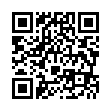
This file has been shared publicly by a user of PDF Archive.
Document ID: 0000122673.